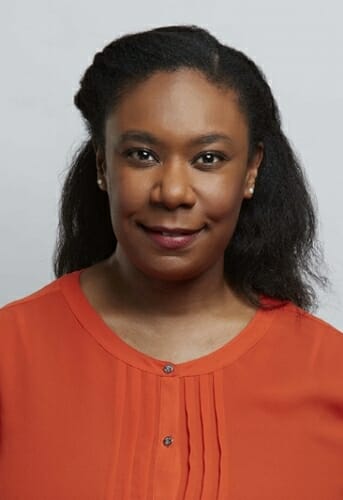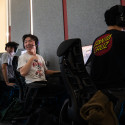Gimlet’s Kendra Pierre-Louis to visit virtually as Science Writer in Residence
Climate reporter Kendra Pierre-Louis of the podcasting company Gimlet Media will be this fall’s Science Writer in Residence for the program’s first virtual visit in its 35-year history.
Pierre-Louis will meet with classes the week of Oct. 26. She will also partner with life sciences communication Professor Dietram Scheufele for a keynote talk on the challenges of science communication in an era of coronavirus and climate change as part of the Crossroads of Ideas series on Wednesday, Oct. 28, at 5 p.m.
In their talk, Pierre-Louis and Scheufele will discuss the parallels in the U.S. between the stalemate on climate change and the ideological divide over how to address the COVID-19 pandemic. Both debates represent paralyzing dysfunction in today’s public conversations about scientific issues, they say. The virtual talk is free and open to the public and will feature conversation with the audience. Register on the Crossroads of Ideas website to receive a link to attend.
As a climate reporter on the new Gimlet Media podcast “How to Save a Planet,” Pierre-Louis discusses everything from the surprising benefits of trees to why everyone needs a “go bag” — and friendly neighbors — in a disaster.
In a recent episode of the show about peoples’ response to the increasing frequency and severity of storms, Pierre-Louis tells co-hosts Alex Blumberg and Ayana Elizabeth Johnson that disaster experts prefer the term “natural hazard” over natural disaster.
“Because (natural disaster) kind of skips past the fact that humans are kind of responsible, based on where we build our homes or our behaviors, into turning that into a disaster,” she says. “If a hurricane hits a beach that nobody lives on, it’s just weather.”
Before joining Gimlet earlier this year, Pierre-Louis worked on the New York Times climate desk, and previously at Popular Science and Inside Climate News. She wrote the book “Green Washed: Why We Can’t Buy Our Way to a Green Planet.”
Pierre-Louis had been scheduled to visit the UW–Madison campus in the spring of 2020 until the COVID-19 pandemic disrupted travel and in-person events.
A partnership between the School of Journalism and Mass Communication and University Communications, the UW–Madison Science Writer in Residence Program invites leading science journalists to share their expertise with students, instructors and the public. Past science writers in residence include Apoorva Mandavilli of the autism news site Spectrum (now at the New York Times), the Atlantic’s Ed Yong, Ira Flatow of “Science Friday,” Soren Wheeler of Radiolab, and the Washington Post’s Laura Helmuth, who is now at Scientific American, among many others.
The program was established in 1986 through the support of the Brittingham Trust. It continues with support from the University of Wisconsin Foundation.




